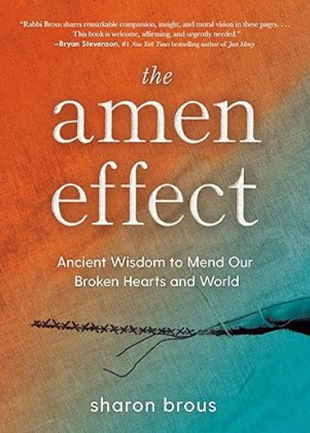The author of this book is one of the most prominent rabbis in the United States, who founded a congregation in Los Angeles that’s become a model for others around the country. She is also no stranger to Washington DC, having been the rabbi chosen to bless both Presidents Obama and Biden at their inaugural prayer services.
Most importantly, Sharon Brous is one who carries the message and voice of the Hebrew prophets, captured in writings that remain sacred to Jews, Christians, and Muslims, into our time.
She is concerned with injustice, with those who are wanting, and with each person who sits alone. Brous focuses on human connections as the antidote to loneliness and teaches that every human heart can hold simultaneously sorrow and celebration.
She encourages us to be healers: visiting the sick in-person, offering to sit with others when they are in pain. There is a “fellowship of suffering,” she explains in chapter 6, and “our presence when someone is suffering is imbued with a kind of Divinity.”
Joy permeates all of this focus and attention on justice. For example, chapter 5, “Grieve and Live,” begins with a quote from Kahlil Gibran and includes this teaching: “Cultivating hearts that can hold both sorrow and celebration is deep spiritual work.” Brous knows this from deep experience in the Jewish community, as a spiritual companion with others and relays this in many anecdotes from her life and from those she has known well.
We found chapter 7, called “Bear With-ness,” particularly insightful. The chapter begins with a quotation from Sojourner Truth and includes many stories from the early years of Brous’ rabbinate, as well as about the biblical Jacob. It concludes with teaching the value in times of grief of “someone to bear with-ness,” who knows to ask what someone wants “rather than assume,” who knows that they can’t fix the situation but can “sit by her side and make her smile.”
Brous writes very well, with passion and energy. Her sermons are said to be extraordinary, and are mentioned as the starting point for this book. She writes here that “Even when there is no bright, new dawn, there are still always moments of goodness, laughter, and light, even in the dark of night.” And she encourages her readers to remember to find such moments, to raise them up, and to do good in the world.
All of this attention to mending the world begins with a kind of spiritual rewiring that Brous teaches, so that we begin to see each other clearly. This is what she calls the “amen effect” of the book’s title. No stranger to politics and political leaders, she insists that our current problems are “not only a political crisis, but also a spiritual crisis.” See the excerpt accompanying this review for more.
Go Deeper:
As Long as the Candle Is Burning: A spiritual practice from the rabbinic sage Rabbi Israel Salanter for reconciling, making peace, giving charity, and helping others while we can.
